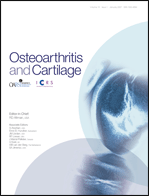
OSTEOARTHRITIS
Efficacy & safety of genetically engineered chondrocytes with TGF-β1 vs placebo in knee OA
Osteoarthritis Cartilage. 2015 Dec;23(12):2109-18.102 patients with grade III (Kellgren-Lawrence) knee osteoarthritis were randomized to intra-articular injection administration of either genetically engineered chondrocytes expressing TGF-b1 (GEC-TGF-b1; TissueGene-C; TissueGene Inc.) or placebo. The purpose of this study was to evaluate the efficacy and safety of the GEC-TGF-b1 investigational product. Primary outcomes for function and pain (IKDC subjection and visual analog scale, respectively) demonstrated significantly greater improvement in the GEC-TGF-b1 group compared to the placebo group at 12 and 52 weeks post-injection, but not at 4 and 24 weeks post-injection. Secondary outcomes of function and quality of life did not significantly differ between groups. Adverse events occurred in 87% of the GEC-TGF-b1 group and 77% of the placebo group. Majority of AEs in the GEC-TGF-b1 group were of moderate severity and deemed at least possibly related to treatment. Most common AEs in the GEC-TGF-b1 were joint inflammation, arthralgia, and effusion
Unlock the full ACE Report
You have access to {0} free articles per month.Click below to unlock and view this {1}
Unlock NowCritical appraisals of the latest, high-impact randomized controlled trials and systematic reviews in orthopaedics
Access to OrthoEvidence podcast content, including collaborations with the Journal of Bone and Joint Surgery, interviews with internationally recognized surgeons, and roundtable discussions on orthopaedic news and topics
Subscription to The Pulse, a twice-weekly evidence-based newsletter designed to help you make better clinical decisions
Exclusive access to original content articles, including in-house systematic reviews, and articles on health research methods and hot orthopaedic topics
Or upgrade today and gain access to all OrthoEvidence content for just $1.99 per week.
Already have an account? Log in


Subscribe to "The Pulse"
Evidence-Based Orthopaedics direct to your inbox.
{0} of {1} free articles
Become an OrthoEvidence Premium Member. Expand your perspective with high-quality evidence.
Upgrade Now












































































